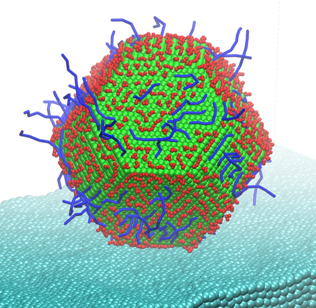In this webinar, we have the pleasure to host Prof. Doros N. Theodorou from the National Technical University of Athens, School of Chemical Engineering, Department of Materials Science and Engineering, who will talk about the latest developments in using molecular-based approaches for understanding and tailoring structure-property-processing relations in materials such polymers.
Polymers are important base materials for many products, both in industry and day-to-day life. It is therefore important, to understand and predict their properties as a design criterion for the final product. Materials science techniques based on the fundamental principles of quantum and statistical mechanics, have gained ground in academic research and industrial practice. They have been greatly aided by an unprecedented growth in computer power, but also by new, efficient theoretical and computational methods and algorithms. The broad spectra of length and time scales governing structure and dynamics in real-life materials have demanded the advancement of multiscale modelling strategies, involving several levels of representation, to bridge atomic-level constitution and interactions with macroscopic properties. Scienomics will also outline equivalent methods in its MAPS platform for materials modeling. In particular, we will outline how you can:
- Parametrize mesoscopic force fields from atomistic simulations
- Predict surface and interfacial tension
- Predict rheological properties
Abstract of Professor Theodorou’s talk:
Meeting the Challenge of Long Times in Entangled Macromolecules: From Atomistic to Mesoscopic Modelling
Doros N. Theodorou
National Technical University of Athens, School of Chemical Engineering, Department of Materials Science and Engineering, 9 Heroon Polytechniou Street, Zografou Campus, 157 80 Athens, Greece
Molecular-based approaches for understanding and tailoring structure-property-processing relations in materials, based on the fundamental principles of quantum and statistical mechanics, have gained ground in academic research and industrial practice. They have been greatly aided by an unprecedented growth in computer power, but also by new, efficient theoretical and computational methods and algorithms. The broad spectra of length and time scales governing structure and dynamics in real-life materials have demanded the advancement of multiscale modelling strategies, involving several levels of representation, to bridge atomic-level constitution and interactions with macroscopic properties.
In this talk we will discuss two mesoscopic modelling approaches to structure-property relations in polymeric materials, parameterized on the basis of atomistic simulations: (a) EMSiPoN, a slip spring-based hybrid particle-field Brownian Dynamics/kinetic Monte Carlo simulation approach to entangled polymer melts in the bulk and at interfaces; this has been applied to predict linear and nonlinear rheological properties of high-molecular weight molten cis-1,4 polyisoprene (1) and polyethylene (2), surface tension, structure, and dynamics (3), and the kinetics of adsorption and desorption of chains at melt/solid interfaces (4). (b) RuSseL, a three-dimensional self-consistent field theoretic formulation for inhomogeneous polymer melt systems containing interfaces, in the presence or absence of grafted chains; invoking a realistic free energy density for nonbonded interactions, as well as efficient finite difference (5) and finite element numerical solution schemes (6), RuSseL has yielded quantitative predictions for melt surface tensions (7), potentials of mean force between solid surfaces bearing grafted chains in a melt (8), the structure (9) and solvation free energy (10) of grafted spherical nanoparticles, and the potential of mean force between such nanoparticles in a melt, serving as a starting point for designing the dispersion of solid nanoparticles in high molar mass polymer matrices to form nanocomposites based on well-defined parameters (nanoparticle size, contact angle of polymer on solid, lengths of grafted and matrix chains, surface grafting density).
(1) Vogiatzis, G.G.; Megariotis, G.; Theodorou, D.N. Macromolecules 2017, 50, 3004.
(2) Sgouros, A.P.; Megariotis, G.; Theodorou, D.N. Macromolecules 2017, 50, 4524.
(3) Sgouros, A.P.; Lakkas, A.T.; Megariotis, G.; Theodorou, D.N. Macromolecules 2018, 51, 9798.
(4) Sgouros, A.P.; Vogiatzis, G.G.; Megariotis, G.; Tzoumanekas, C.; Theodorou, D.N. Macromolecules 2019, 52, 7503.
(5) Revelas, C.J.; Sgouros, A.P.; Lakkas, A.T.; Theodorou, D.N. Computation 2021, 9, 57.
(6) Revelas, C.J.; Sgouros, A.P.; Lakkas, A.T.; Theodorou, D.N. AIP Conf Proc. 2021, 2343, 130002.
(7) Lakkas, A.T.; Sgouros, A.P.; Theodorou, D.N. Macromolecules 2019, 52, 5337.
(8) Sgouros, A.P.; Revelas, C.J.; Lakkas, A.T.; Theodorou, D.N. Polymers 2021, 13, 1197.
(9) Lakkas, A.T.; Sgouros, A.P.; Revelas, C.J.; Theodorou, D.N. Soft Matter 2021, 17, 4077.
(10) Sgouros, A.P.; Revelas, C.J.; Lakkas, A.T.; Theodorou, D.N. J. Phys. Chem. B 2022, 126, 7454.

Figure 1: Mesoscopic representation of a nanoparticle on Graphene surface
Register to our webinar
